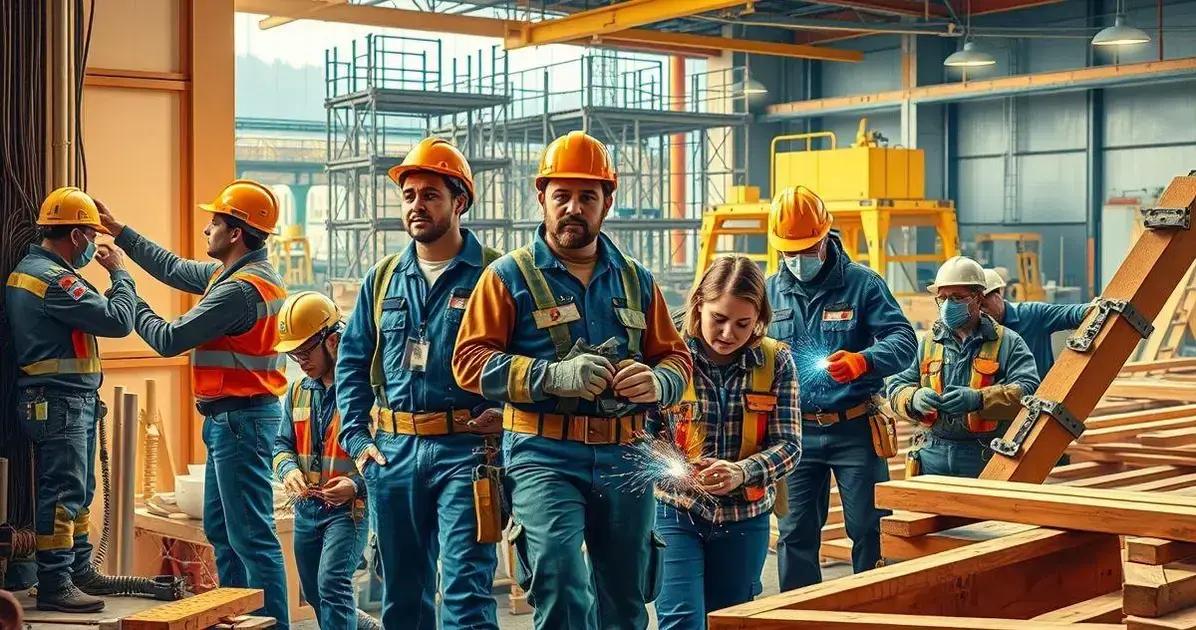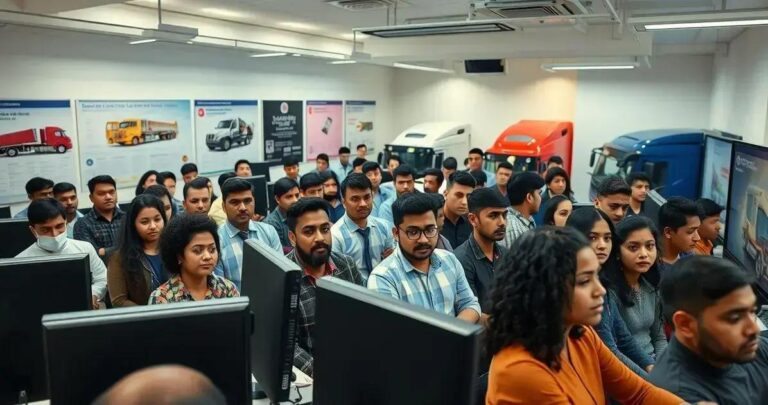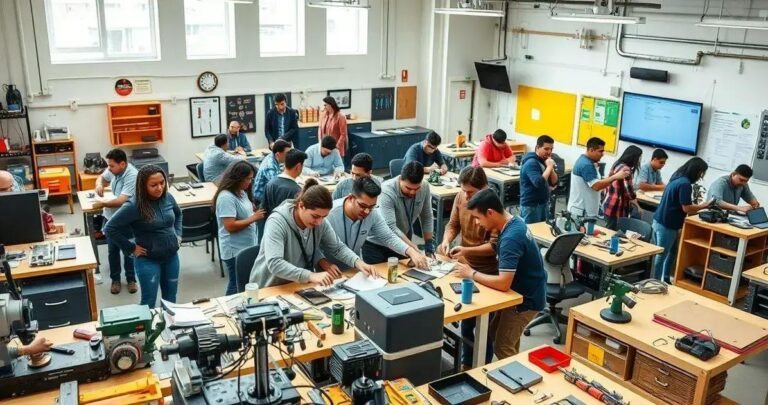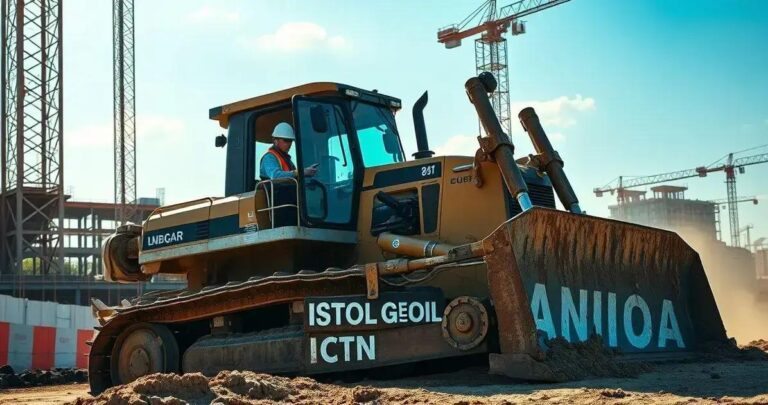Skilled Trades Jobs: Unlock Your Path to a Rewarding Career Today
Anúncios
**Skilled trades jobs** are increasingly in demand as industries seek qualified professionals to fill essential roles. Discover how these careers not only offer stability but also potential for growth and personal satisfaction. From plumbing to electrical work, skilled trades cover a wide range of fields that are pivotal to everyday life. In this article, we’ll delve into the demand, required training, and rewards of pursuing a skilled trade career.
Exploring the Demand for Skilled Trades Jobs
The demand for skilled trades jobs is surging, driven by factors such as retirement of older workers and robust growth in construction and manufacturing sectors. Companies across the globe are experiencing a gap in qualified skilled trades professionals, increasing opportunities for those interested in technical and hands-on career paths.
Industrial Growth Boosts Demand
With the expansion of automotive, construction, and energy industries, the need for skilled trades workers like electricians and welders has significantly increased. These sectors are the backbone of modern economies, relying heavily on the expertise of tradespeople.
Retirement Opens Up Opportunities
As veteran skilled trades professionals retire, a wide array of positions open up for newcomers. This wave of retirements presents a unique opportunity for young people to enter stable jobs offering competitive salaries and benefits.
Educational programs are adapting by focusing more on vocational training to keep up with this high demand. High schools and technical colleges are enhancing their programs to better prepare students for skilled trades careers.
Government Initiatives
Many governments are recognizing the need for more skilled trades workers and have introduced policies to encourage vocational training. Grants, subsidies, and scholarships are being offered to attract more individuals to these crucial careers, supporting long-term industry health.
Overall, the growing demand for skilled trades workers represents both a challenge and an opportunity, with the chance for fulfilling and lucrative career paths in this essential field.
Top Skilled Trades Jobs in Today’s Market

In today’s market, skilled trades jobs are flourishing, driven by diverse industries requiring hands-on expertise. These roles are crucial in maintaining infrastructure and supporting modern living standards.
Electricians: Powering Modern Life
Electricians install, maintain, and repair electrical systems. As technology evolves, the demand for electricians grows to accommodate new installations in homes, businesses, and factories.
Plumbers: Ensuring Flow and Functionality
Plumbers are essential for installing and repairing water systems. They work in residential, commercial, and industrial settings, ensuring everything from clean drinking water to safe waste disposal.
Welders: Metal and Structure Masters
Welders create and fix metal structures, making them integral in construction, manufacturing, and shipbuilding. Their skill with precision tools builds everything from cars to skyscrapers.
Heavy equipment operators also play a critical role. They maneuver machinery for forestation, construction, and mining, impacting multiple aspects of infrastructure development.
Carpenters: Building Foundations
Carpenters shape and install wood frameworks in buildings. Their work is foundational to construction, spanning from framing houses to installing cabinetry.
These jobs offer not only job security but the potential for entrepreneurship. Skilled trades workers can often start their own businesses, making it a lucrative career path.
Training and Certifications for Skilled Trades
Entering the field of skilled trades often requires specific training and certifications. These credentials not only enhance your skills but also improve job prospects and earning potential.
Apprenticeships: Hands-On Learning
Apprenticeships provide practical experience under the guidance of seasoned professionals. They combine on-the-job training with classroom instruction, offering a well-rounded education in trades like carpentry, plumbing, and electrical work.
Technical Schools: Education for Trades
Technical schools offer focused programs that equip students with the skills needed for various trades. Programs vary in length and often include certifications that validate a student’s expertise and readiness for the workforce.
Certifications: Validating Expertise
Obtaining certifications is crucial in the trades industry. They demonstrate proficiency and commitment, with certifications available for HVAC technicians, electricians, and more, highlighting specialized skills to employers.
In addition to national certifications, many states have specific licensing requirements. Staying informed about these regional nuances ensures compliance and adherence to standards, keeping skilled tradespeople at the top of their game.
Continuous education is also vital as technology and techniques evolve. Many trades offer advanced certifications that allow professionals to expand their skillsets and tackle more complex projects.
Benefits of Pursuing a Career in Skilled Trades

Pursuing a career in skilled trades offers numerous benefits that appeal to many job seekers today. From financial stability to job satisfaction, skilled trades provide rewarding career paths.
Financial Independence and Growth
Skilled trades jobs often come with competitive salaries and benefits, sometimes exceeding those of traditional white-collar roles. With fewer costs for education and the potential for overtime, these careers can quickly lead to financial independence.
Job Security and Demand
The demand for skilled trades workers continues to grow, ensuring job security for those entering the field. As infrastructure ages and industries expand, tradespeople remain vital, offering consistent employment opportunities.
Hands-On and Dynamic Work
For those who dislike desk jobs, skilled trades provide active and varied work environments. Daily tasks involve problem-solving and applied skills, keeping the job engaging and dynamic.
Many skilled trades workers also experience a strong sense of accomplishment. Seeing tangible results from their work, like a completed project or a functioning system, adds to job satisfaction.
Entrepreneurial Opportunities
Skilled trades offer numerous paths for entrepreneurship and self-employment. Many tradespeople start their own businesses, allowing for flexibility and control over their careers.
Overall, pursuing a skilled trade can lead to a fulfilling and prosperous career, combining personal satisfaction with practical benefits.
Challenges Faced in Skilled Trades Careers
While pursuing a career in skilled trades is rewarding, it also comes with its own set of challenges. These hurdles often require resilience and adaptability from workers.
Physical Demands and Safety
Skilled trades jobs can be physically demanding, requiring strength and endurance. Workers often perform tasks in diverse environments, which can increase the risk of injury without proper safety measures.
Fluctuating Work Hours
Many trades involve unpredictable work hours, especially during peak project times. This variability can make maintaining a work-life balance challenging for some tradespeople.
Need for Continuous Training
As technology evolves, tradespeople must keep pace with new techniques and tools. Ongoing education and training are necessary to remain competitive and meet industry standards.
The aging workforce in skilled trades also poses challenges. With seasoned professionals retiring, the transfer of knowledge and expertise to younger workers becomes crucial but sometimes difficult.
Perceptions and Misconceptions
Despite the benefits, skilled trades can be seen as less prestigious compared to four-year degrees. Changing this perception remains a challenge in attracting new talent to the field.
These challenges, while significant, highlight the importance of skilled trades in the modern economy and the dedication required from those within these careers.
Future Outlook for Skilled Trades Jobs

The future outlook for skilled trades jobs is promising, reflecting constant industry needs and technological advancements. These roles are expected to remain vital to supporting global economies.
Technological Integration
Advances in technology present both opportunities and challenges for tradespeople. Automation and smart technology are becoming more prevalent, requiring continuous learning and adaptation in trades like electrical and welding services.
Infrastructure Investments
Many countries are investing in infrastructure upgrades, creating a growing demand for skilled trades workers. These developments ensure job stability and prospects for future growth in construction-related fields.
Shift in Workforce Demographics
The retirement of veteran tradespeople opens doors for new entrants. There is an increasing focus on attracting diverse talents, including more women and minorities, into these traditionally male-dominated fields.
Educational institutions are expanding vocational programs to better prepare students for the evolving demands of skilled trades, emphasizing STEM education alongside traditional craftsmanship.
Environmental Focus
Green technology and sustainability efforts are shaping the future of skilled trades. Roles in renewable energy and eco-friendly building are gaining importance, aligning with global environmental goals.
In summary, skilled trades careers offer abundant opportunities and security. Recognizing the patterns and preparing accordingly ensures readiness for the ever-changing landscape of these essential jobs.
A Future Brimming with Opportunities
The journey through skilled trades jobs highlights both the significant opportunities and challenges within this vital sector. These careers promise financial stability, personal satisfaction, and the ability to adapt alongside technological advancements.
From embracing apprenticeships and certifications to understanding the changing demands and technological integration, every aspect of skilled trades careers is evolving. Society’s increasing reliance on infrastructure and sustainable practices only enhances the demand for skilled tradespeople.
Overcoming hurdles like fluctuating work hours and maintaining physical health underscores the resilience required in this field. Yet, with hands-on experience and continuous growth, skilled trades offer a path rich with diverse prospects.
Therefore, seeing the transformation and potential in skilled trades encourages a new generation to step into these roles, unlocking their path to a rewarding career today.
FAQ – Frequently Asked Questions about Skilled Trades Careers
What are the key benefits of pursuing a career in skilled trades?
Skilled trades careers offer competitive salaries, job security, hands-on work, and entrepreneurial opportunities. They are vital to modern infrastructure and offer personal satisfaction.
What qualifications do I need to start a career in skilled trades?
Qualifications vary, but typically include technical school programs, apprenticeships, and certifications specific to the trade, such as electrician or plumbing licenses.
How does technological advancement impact skilled trades jobs?
Advancements require tradespeople to continually update their skills. Automation and smart technology are integrated into various trades, enhancing efficiency and requiring ongoing education.
What are some challenges faced in skilled trades careers?
Challenges include physical demands, variable work hours, and the need for continuous training to keep up with industry changes, along with overcoming societal misconceptions about the trades.
How is the demand for skilled trades jobs expected to change in the future?
The demand is expected to grow due to infrastructure investments, environmental initiatives, and the retirement of older tradespeople, ensuring continued need for skilled professionals.
Can women pursue careers in skilled trades?
Absolutely. Although traditionally male-dominated, more women are entering skilled trades, supported by initiatives to diversify and expand the workforce.






